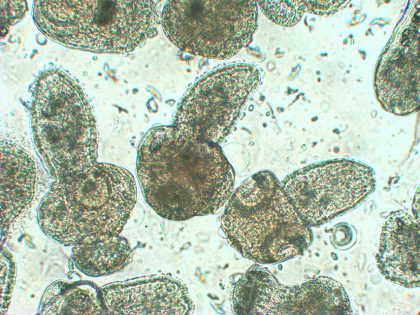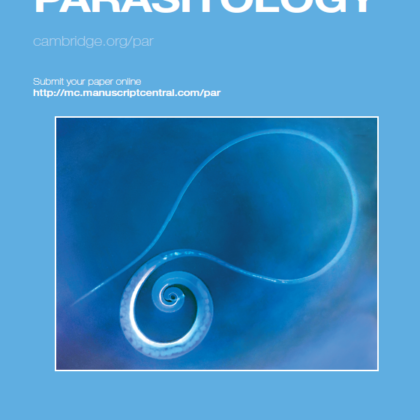Meet the Editors: Q&A with Professor Laura Rinaldi, Editor for Parasitology
Welcome to our “Meet the Editors” series, where we interview the editorial team about their work and their relationship to the journal. In this post we meet Professor Laura Rinaldi, Editor for Parasitology
What is your current job title both within Parasitology and outside of the journal? Where are you based in the world?
Since June 2020, I have been appointed as one of the Editors of Parasitology. I live in Napoli (southern Italy) where I am Full Professor of Parasitology and Parasitic Diseases at the Department of Veterinary Medicine and Animal Production, University of Napoli Federico II.
In a few sentences, please describe the focus of your work. Which parasites do you study? What is the goal of your research? What approaches do you use in your work?

Photo courtesy of Shutterstock
I have been working at the department for over 20 years. Currently, I coordinate a research group of 10 enthusiastic PhDs and Post-docs who focus their research on different topics of parasitology, e.g. diagnosis and control of helminths (e.g. gastrointestinal nematodes and flukes) and antIhelmintic resistance in ruminants, epidemiology and control of Echinococcus granulosus, epidemiology, diagnosis and control of dirofilariosis in pets, but also diagnosis, mapping and control of human soil-transmitted helminths. Hard-working, intellectual honesty, and networking are the leitmotiv of my research work.
When did you first become interested in parasitology as a field? Did a particular teacher or mentor direct your career path?
I must admit that I became interested in parasitology by sheer chance. As an undergraduate student I was interested in plant physiology. Then I was introduced to the field of parasitology by my mentor Prof. Giuseppe Cringoli, il maestro, who conveyed his passion and enthusiasm for the discipline. I owe my success to him and to the entire research team of parasitologists in Napoli. For over 20 years I have been proud to be a parasitologist and have been madly in love with parasites and completely addicted to them!
How did you first become familiar with the Parasitology journal?
I became familiar with Parasitology as soon as I started working in this research field. In our scientific community Parasitology has been considered one of the most authoritative and prestigious scientific journals ever. When I attended my first BSP spring meeting back in 2012, I really experienced the scientific and, let me say, British soundness of the journal. Thereafter I still remember my first article published in the Parasitology journal “Exploring the interface between diagnostics and maps of neglected parasitic diseases”….what a nice gratification!
What motivated you to become an editor at the Parasitology journal?
In April 2020, I received a nice e-mail from my friend Russell Stothard with his kind and informal invitation to become one of the Editors of Parasitology. What a great surprise…it was really a relief for me during the pandemic fatigue caused by the coronavirus lockdown in Italy. I must confess that I was rather nervous for such an important commitment but from the very start I felt that Parasitology had a friendly, family atmosphere. Since then I have had the possibility to weave an intense collaborative network with Russ and the entire staff at Cambridge University Press.
What is the best part of editing for Parasitology?
I really enjoy working as a team with my friend Russell Stothard, the Editor-in-chief, the other editors of Parasitology and the production staff at Cambridge University Press. We have online monthly catchup meetings that are very useful to discuss any issues around the journal. Editing for Parasitology is an opportunity to entirely manage the peer-review process of interesting manuscripts dealing with my focus area of research, i.e. veterinary parasitology and in particular epidemiology, diagnosis and control of helminth infections.
For all the manuscripts I have handled so far, I really enjoyed the whole editing workflow: reading the papers and the cover letters, searching for suitable reviewers, going through their constructive criticisms and suggestions to improve the manuscript, checking the revised versions, coming to a decision aimed at pursuing the high standards of the journal. Finally, when you see the article published …it is a great achievement…mission accomplished!
Sometimes I even feel inspired by papers reporting the research findings from the network of authors that contribute to the journal, especially for manuscripts dealing with my research topics. I soon become very excited about them! Also it can happen that I handle pieces from eminent and outstanding parasitologists, I recently felt truly honoured to manage a review on Toxoplasma by J.P. Dubey, one of the pioneers in Apicomplexa research.
Do you have any advice for those submitting to Parasitology?
In coming to a decision whether a research paper is worthy of publication in Parasitology we ask the authors to consider whether the paper describes a significant advancement in the field. Before submitting a manuscript, I would suggest carefully reading the “aims and scope” of the journal but also the “instructions for authors” to adhere to the manuscript format. It is strongly recommended that authors upload a cover letter outlining the main themes and findings of the paper, its novelty and relevance to the wide research community.
In my opinion, the authors ought to dare more in capturing the attention of the editors! My advice is making parasitology-related findings engaging and relevant. I strongly believe in the approach of storytelling in science. A truly captivating and well-written manuscript has the power of maintaining the interest of the editors, the referees and the readers thereafter.
What advice would you give to early career researchers who are just starting out in parasitology as a field?
My main advice to ECRs who are approaching parasitology is to keep in mind that “tradition and innovation” are both needed to enrich parasitology within the network of research. The general nature of parasites, a broad category of pathogens, is difficult to distill, and innovative approaches require a well-orchestrated integration of ideas, skills and know-how from different background and specialties. Coordination among parasitologists and integration and collaboration with other academic figures as well as enterprises, practitioners, field workers, stake-holders, policy-makers and end-users through dissemination, exploitation and outreach are the most exciting challenges for parasitology in the near future.
I very much hope that young parasitologists never forget to preserve tradition and always contribute to the promotion of the advancement of parasitology as a field of basic and clinical sciences. I would recommend young parasitologists a few fundamentals to make their scientific dreams come true: working hard but having fun in doing research, being humble but at the same time ambitious and competitive, creating an international network of research, being independent but always inspired by and grateful to their mentors.
Parasitology is an important specialist journal covering the latest advances in the subject. It publishes original research and review papers on all aspects of parasitology and host-parasite relationships, including the latest discoveries in parasite biochemistry, molecular biology and genetics, ecology and epidemiology in the context of the biological, medical and veterinary sciences.






